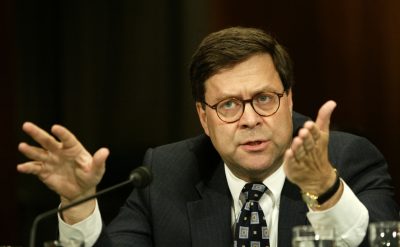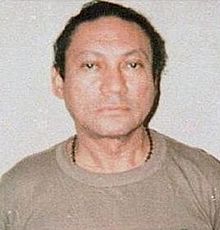William Barr Greenlit Bush’s Invasion of Panama, Is Venezuela Next?

The US Justice Department unsealed an indictment on Venezuelan President Nicolas Maduro and other government officials last week, accusing them of “narco-terrorism.” The move is reminiscent of the 1988 indictment of former CIA asset and Panamanian leader Manuel Noriega. The Noriega indictment resulted in a US invasion of Panama that left hundreds – possibly thousands – of dead civilians in its wake. Attorney General William Barr took to the podium to announce Maduro’s indictment. Barr happens to be the same person who gave the first Bush administration the legal justification to invade Panama just over 30 years ago.
Barr first worked in the DOJ in 1989 when George H. W. Bush appointed him as head of the Office of Legal Counsel (OLC). Bush and Barr had some history together. The two first crossed paths in 1976 when Bush was head of the CIA, and Barr served as a congressional liaison for the agency. At the time, Manuel Noriega was also on the CIA’s payroll.
Noriega served as a useful tool for the CIA for decades, most notably known for helping the US send money and weapons to the Contras in Nicaragua. But after Noriega became more of a liability than an asset, the US turned on him. Noriega’s connection to drug trafficking became the pretext for his disposal, something the US government was undoubtedly aware of long before the indictment.
In 1988, the Senate subcommittee on terrorism, narcotics, and international operations said,
“It is clear that each US government agency which had a relationship with Noriega turned a blind eye to his corruption and drug dealing, even as he was emerging as a key player on behalf of the Medellin Cartel (Pablo Escobar’s infamous Colombian cartel).”
In February 1988, under the Reagan administration, the US indicted Noriega on charges of Drug trafficking and racketeering, and he was taken off the CIA’s payroll. Over the next year, the US placed economic sanctions on Panama in an effort to pressure Noriega to step down. When Bush came into the White House in January 1989, he continued adding sanctions, and tensions between Noriega’s military and US troops stationed in Panama increased. The US controlled the Panama Canal at the time, so there was a strong US military presence in the country, and tens of thousands of US citizens were living there.
It was around the time of ever-growing tensions between Noriega and the US that William Barr was asked by then-Attorney General Dick Thornburgh to author a legal opinion memo. The purpose of Barr’s opinion memo was to overrule an opinion written in 1980 by President Carter’s head of the OLC that ruled the FBI does not have international authority to arrest a person in another nation if that nation does not consent. The opinion written under Carter said,
“US agents have no law enforcement authority in another nation unless it is the product of that nation’s consent.”
Barr’s opinion said that the FBI could carry out arrests in other nations, even if it violates international law. The document, dated June 21st 1989, reads,
“At the direction of the President or the Attorney General, the FBI may use its statutory authority to investigate and arrest individuals for violating United States law, even if the FBI’s actions contravene customary international law.”
Barr wrote,
“The 1980 Opinion was clearly wrong in asserting that the United States is legally powerless to carry out actions that violate international law by impinging on the sovereignty of other countries. It is well established that both political branches — the Congress and the Executive — have, within their respective spheres, the authority to override customary international law.”
In November 1989, after the document’s existence became known, Barr testified before Congress on its contents. Barr refused to make the document itself public and did not disclose all of its contents, which caused some controversy, but that seemed to be a distraction from the real issue – the belief that the president is above international law. Writing in the Los Angeles Times in October 1989, journalist Ron Astrow said his sources in the White House dubbed Barr’s ruling “the president’s snatch authority.” Astrow speculated that this new authority could be used to arrest Noriega.
On December 20th 1989, President Bush launched Operation Just Cause. Over 27,000 troops invaded Panama to arrest Noriega, the largest US military action since the Vietnam war. The campaign was especially brutal for civilians. The neighborhood of El Chorillo in Panama City saw the worst destruction. US forces indiscriminately bombed El Chorillo without giving the residents any notice, resulting in civilian deaths and the destruction of about 4,000 homes. Horrific stories of US tanks running over and crushing civilians surfaced after the invasion, and witnesses described a total disregard for civilian life by the US forces.
The civilian death toll given by the US government is around 200, but that number is widely disputed. Some human rights groups say the number is in the thousands. Either number is horrific considering Noriega was captured on January 3rd 1990, and the campaign only lasted two weeks. Victims claim many bodies were buried in mass graves and never counted, and to this day, families of the dead are still searching for the bodies of their loved ones. In 2019, Panama made December 20th an official day of mourning.
Bush did not get Congressional approval for the invasion, violating the War Powers Act that was passed in 1973 after President Nixon’s bombings of Cambodia and Laos. Bush publicly justified the invasion on the grounds of self-defense. A US marine was killed in Panama a few days before the invasion, part of an escalating series of confrontations between US troops and the Panamanian military. Some reports say US troops were purposely provoking members of Panama’s armed forces. The indictment of Noriega and the harsh economic sanctions were probably enough provocation to cause incidents between the two countries’ armed forces.
The invasion violated at least two international treaties: The United Nations Charter and the Charter of the Organization of American States (OAS). Shortly after the invasion began, the OAS voted 20 to 1 in favor of an immediate US withdrawal. The UN General Assembly denounced the invasion in a vote of 75 to 20. Barr’s opinion memo made it clear that the Bush administration was not concerned with violating international law.
Barr believed in a strong Executive branch and later advised Bush that he did not need Congressional approval for the war against Iraq. In 1991, Barr’s support for Bush’s leadership was rewarded, and he was nominated to be the 77th Attorney General of the United States. Fast forward about 30 years later, and William Barr is back in that office.
With the indictment of Maduro, the DOJ placed a $15 million bounty on his head, offering that money for any information that leads to his arrest. Indicting a head of state is an incredible provocation, but by US logic, Maduro is no longer Venezuela’s president. Since opposition leader Juan Guaido declared himself president of Venezuela in January 2019, the US and its allies have not recognized the Maduro government, even though he still holds power in Caracas. As Barr put it, “We do not recognize Maduro as the president of Venezuela. Obviously, we indicted Noriega under similar circumstances, we did not recognize Noriega as the president of Panama.”
Maduro has always been in the crosshairs of the Trump administration, and this indictment is just another transparent effort of US regime change in the South American country. The allegation against Maduro is that he works with Colombia’s rebel FARC group to smuggle cocaine through Venezuela that eventually reaches the US. According to Barr, the route the cocaine takes is either on boats through the Caribbean, or on airplanes through Honduras.
A closer look at where the cocaine in the US comes from shows the vast majority does not pass through Venezuela. A report released by the Washington Office for Latin America (WOLA) earlier in March debunked the myth spread by Washington that Venezuela is a top narco-state. Using the US government’s own numbers, the WOLA report found that in 2017 only 7 percent of the cocaine that came to the US moved through Venezuela’s Eastern Caribbean waters. The vast majority, 84 percent, moved through the Eastern Pacific.
Barr estimates around 200 to 250 metric tons of cocaine transits through Venezuela per year. According to the numbers in the WOLA report, 210 metric tons passed through Venezuela in 2018. By comparison, Guatemala had over 1,400 metric tons pass through it that same year. Both Venezuela and Guatemala are known as “transit countries,” meaning they do not produce cocaine, it only transits through. Colombia, the world’s top producer of cocaine, had about 2,400 metric tons moved through the country in 2018.
The numbers show that if the concern was drug trafficking and not regime change, the US has much bigger fish to fry than Nicolas Maduro if the allegations against him are even true. Economic sanctions placed on Venezuela by the Trump administration make it near impossible for the country to sell its oil, Venezuela’s greatest natural resource. If Maduro really was the corrupt “narco-terrorist” the US claims he is, wouldn’t sanctioning the oil sector make him more reliant on drug money and increase the flow of cocaine? Since the oil sanctions started in 2017, the flow of cocaine through Venezuela has actually decreased.
The Center for Economic Policy and Research (CEPR) released a report in April 2019 that found US sanctions on Venezuela were responsible for 40,000 deaths in the country. Experts believe the updated number is now around 100,000 since the crippling sanctions are still in effect. The CEPR report explains how sanctions impact Venezuela’s medical supplies, and with the country now facing a possible coronavirus outbreak, those sanctions will only exacerbate the epidemic. The indictment of Maduro in the midst of a global pandemic shows the world that US imperialism never shows mercy.
Realistically, a US invasion of Venezuela to arrest Maduro is unlikely. The task would prove much more difficult than the invasion of Panama. Venezuela is much bigger and is lacking the US military presence Panama had in the 80s. The military has stayed loyal to Maduro, and Venezuela’s civilian militia has over three million members. Maduro has called for the creation of an “Anti-Imperialist School” to train his militia members as “professionals.” Anti-imperialism is a key tenant of Maduro’s rhetoric, and Hugo Chavez’s before him, the Trump administration’s Venezuela policy has done nothing but play into this narrative.
But the fact is, there is a president in the White House who has not taken the military option to remove Maduro off the table. And the Attorney General believes the president has the right to invade a sovereign nation to arrest its leader without Congressional approval, even if it is in direct violation of international law.
*
Note to readers: please click the share buttons above or below. Forward this article to your email lists. Crosspost on your blog site, internet forums. etc.


